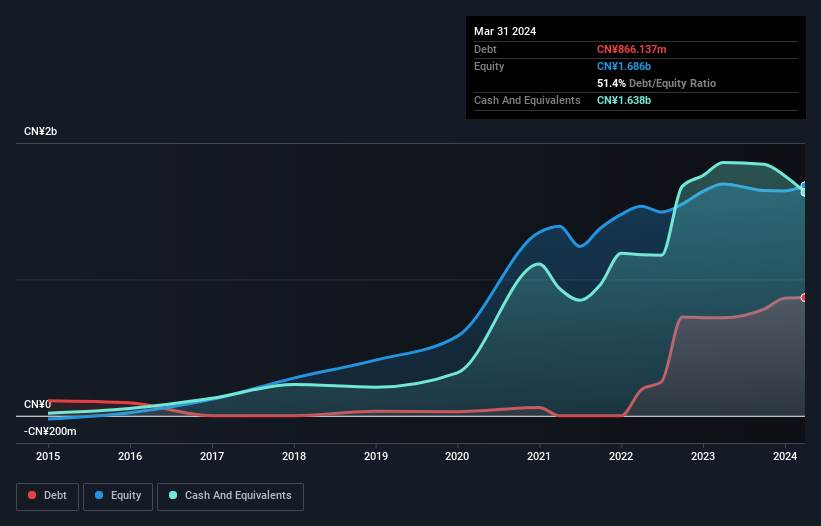- China
- /
- Consumer Durables
- /
- SZSE:300894
Here's Why Marssenger Kitchenware (SZSE:300894) Can Manage Its Debt Responsibly

Some say volatility, rather than debt, is the best way to think about risk as an investor, but Warren Buffett famously said that 'Volatility is far from synonymous with risk.' So it might be obvious that you need to consider debt, when you think about how risky any given stock is, because too much debt can sink a company. We can see that Marssenger Kitchenware Co., Ltd. (SZSE:300894) does use debt in its business. But the real question is whether this debt is making the company risky.
What Risk Does Debt Bring?
Debt and other liabilities become risky for a business when it cannot easily fulfill those obligations, either with free cash flow or by raising capital at an attractive price. Part and parcel of capitalism is the process of 'creative destruction' where failed businesses are mercilessly liquidated by their bankers. However, a more common (but still painful) scenario is that it has to raise new equity capital at a low price, thus permanently diluting shareholders. Of course, the upside of debt is that it often represents cheap capital, especially when it replaces dilution in a company with the ability to reinvest at high rates of return. The first thing to do when considering how much debt a business uses is to look at its cash and debt together.
View our latest analysis for Marssenger Kitchenware
How Much Debt Does Marssenger Kitchenware Carry?
As you can see below, at the end of March 2024, Marssenger Kitchenware had CN¥866.1m of debt, up from CN¥718.3m a year ago. Click the image for more detail. However, it does have CN¥1.64b in cash offsetting this, leading to net cash of CN¥772.3m.

How Strong Is Marssenger Kitchenware's Balance Sheet?
The latest balance sheet data shows that Marssenger Kitchenware had liabilities of CN¥951.6m due within a year, and liabilities of CN¥555.6m falling due after that. On the other hand, it had cash of CN¥1.64b and CN¥139.0m worth of receivables due within a year. So it can boast CN¥270.2m more liquid assets than total liabilities.
This surplus suggests that Marssenger Kitchenware has a conservative balance sheet, and could probably eliminate its debt without much difficulty. Simply put, the fact that Marssenger Kitchenware has more cash than debt is arguably a good indication that it can manage its debt safely.
But the other side of the story is that Marssenger Kitchenware saw its EBIT decline by 9.4% over the last year. If earnings continue to decline at that rate the company may have increasing difficulty managing its debt load. When analysing debt levels, the balance sheet is the obvious place to start. But ultimately the future profitability of the business will decide if Marssenger Kitchenware can strengthen its balance sheet over time. So if you're focused on the future you can check out this free report showing analyst profit forecasts.
Finally, a business needs free cash flow to pay off debt; accounting profits just don't cut it. While Marssenger Kitchenware has net cash on its balance sheet, it's still worth taking a look at its ability to convert earnings before interest and tax (EBIT) to free cash flow, to help us understand how quickly it is building (or eroding) that cash balance. During the last three years, Marssenger Kitchenware produced sturdy free cash flow equating to 76% of its EBIT, about what we'd expect. This free cash flow puts the company in a good position to pay down debt, when appropriate.
Summing Up
While we empathize with investors who find debt concerning, you should keep in mind that Marssenger Kitchenware has net cash of CN¥772.3m, as well as more liquid assets than liabilities. The cherry on top was that in converted 76% of that EBIT to free cash flow, bringing in CN¥187m. So is Marssenger Kitchenware's debt a risk? It doesn't seem so to us. The balance sheet is clearly the area to focus on when you are analysing debt. However, not all investment risk resides within the balance sheet - far from it. For example Marssenger Kitchenware has 2 warning signs (and 1 which makes us a bit uncomfortable) we think you should know about.
When all is said and done, sometimes its easier to focus on companies that don't even need debt. Readers can access a list of growth stocks with zero net debt 100% free, right now.
If you're looking to trade Marssenger Kitchenware, open an account with the lowest-cost platform trusted by professionals, Interactive Brokers.
With clients in over 200 countries and territories, and access to 160 markets, IBKR lets you trade stocks, options, futures, forex, bonds and funds from a single integrated account.
Enjoy no hidden fees, no account minimums, and FX conversion rates as low as 0.03%, far better than what most brokers offer.
Sponsored ContentNew: Manage All Your Stock Portfolios in One Place
We've created the ultimate portfolio companion for stock investors, and it's free.
• Connect an unlimited number of Portfolios and see your total in one currency
• Be alerted to new Warning Signs or Risks via email or mobile
• Track the Fair Value of your stocks
Have feedback on this article? Concerned about the content? Get in touch with us directly. Alternatively, email editorial-team (at) simplywallst.com.
This article by Simply Wall St is general in nature. We provide commentary based on historical data and analyst forecasts only using an unbiased methodology and our articles are not intended to be financial advice. It does not constitute a recommendation to buy or sell any stock, and does not take account of your objectives, or your financial situation. We aim to bring you long-term focused analysis driven by fundamental data. Note that our analysis may not factor in the latest price-sensitive company announcements or qualitative material. Simply Wall St has no position in any stocks mentioned.
About SZSE:300894
Marssenger Kitchenware
Engages in the research and development, design, production, and sale of kitchen appliances and other household electrical appliances in China.
Adequate balance sheet slight.
Market Insights
Community Narratives



